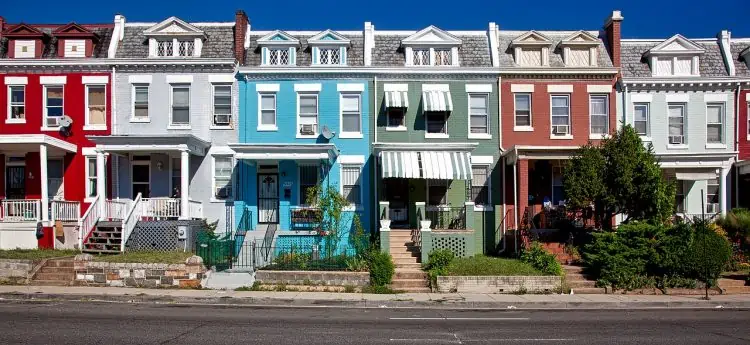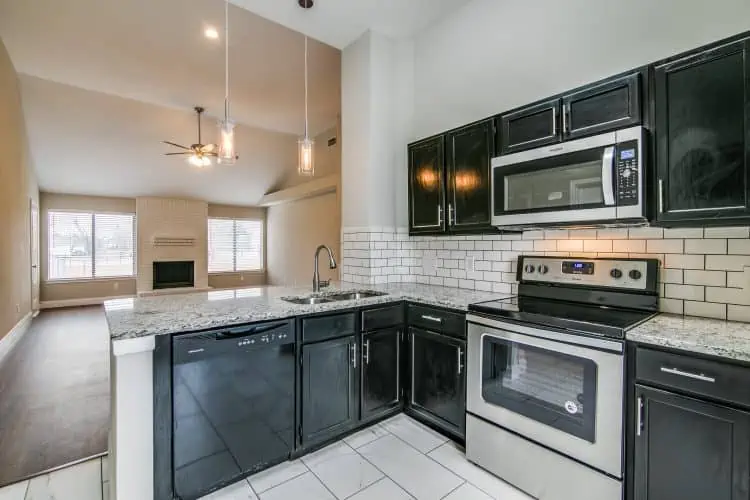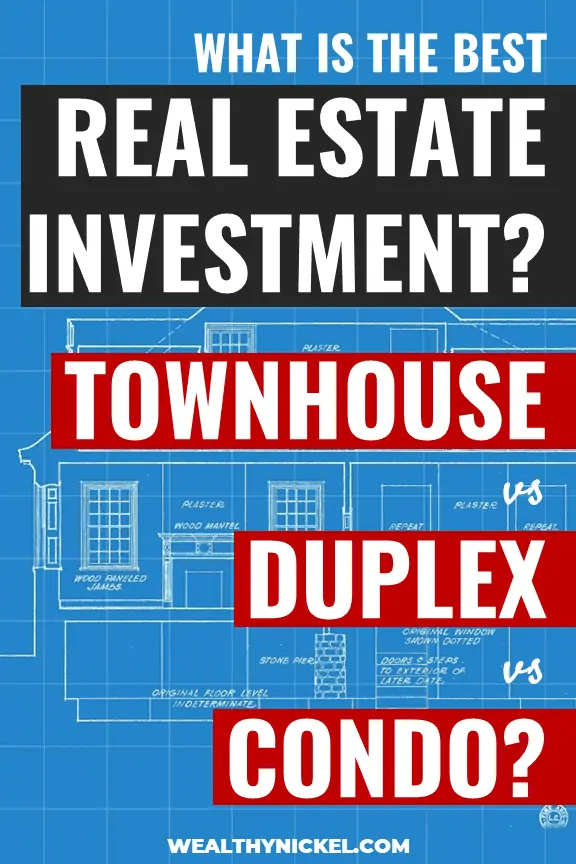The “American dream” typically features the single family detached home, with the allure of privacy, yard space, and a white picket fence. But there are many other options for home-ownership that are less talked about that may be a better fit for you and your family.
Whether you’re looking to buy a home for your family or an investment property, there are many different alternatives to choose from, such as townhouses, duplexes, and condos.
But what’s the difference between them? Each comes with advantages and disadvantages, and the best one for your depends on your needs and situation.
So let’s break it down and see what the major differences are between a duplex, townhouse, and condo.
 What is a Duplex?
What is a Duplex?
A duplex in real estate (or “two-flat” if you’re from Chicago as I learned visiting my wife’s hometown) is typically a single structure with two separate units sharing a common wall.
Two common configurations are a side-by-side duplex that shares a wall in the middle of the structure, or an up-down duplex where one unit is on the first floor and the other unit is on the second floor.
Typically, the entire duplex is owned by one person and is purchased with a single mortgage. Since a duplex is generally less expensive that two single-family houses, you can live in one side and rent out the other to come out ahead on your housing budget. As an investor, there is some economy of scale to owning 2 units under the same roof – typically slightly less maintenance and management cost.
There is actually an entire real estate investing strategy dedicated to buying a duplex, triplex, or quadplex called “house hacking”. It’s a great intro into real estate investing without much money needed that allows you to get a regular owner-occupied mortgage with 3-5% down. You can live in one side and rent out the other to cover some or all of your mortgage payment. Many savvy investors have used this strategy to effectively live for free!
Duplex Summary:
- Structure: A single structure on one parcel of land divided into 2 units.
- Ownership: Entire structure and land (both units) owned by one family.
- # Stories: Generally 1-2 stories tall.
- Maintenance: Owner responsible for all interior, exterior, and landscape maintenance (similar to a single family home).
- Price: A duplex generally costs less per unit than a single family house, and there are no monthly HOA dues.
What is a Townhouse?
A townhouse is typically a 2-or-3 story home that shares walls with its neighbors. Usually there will be multiple townhouses in a single structure, and there would be shared walls with neighbors on either side. According to the U.S. Census, townhouses make up about 6% of the total housing units in the United States.
The major difference between a townhouse and a duplex is that a townhouse is considered a single-family attached dwelling, where you own the unit itself and the land it sits on. Depending on the layout, you may have both a front and back yard, or a small patio area. Generally there will be less yard space (and therefore less maintenance) compared to a single family detached home.
From a financing perspective, a townhouse is treated the same a “normal” house. Since they usually take up less land and there are economies of scale to building a shared structure, you can often save money by buying a townhouse.
One major advantage over a duplex is you can buy just the single unit you will live in, rather than the entire structure. However, with separate ownership comes shared responsibility among the residents for upkeep of the landscaping, exterior structure, and common areas.
Often, this is done through an HOA (home owners association) that collects monthly fees to share the maintenance costs between all owners. Before you buy a townhouse, you should definitely check and see what the HOA dues are and what they cover.
In some cases, the owner may be responsible for yard maintenance, and the HOA covers exterior issues such as the roof and siding. Or the owner could be responsible for everything. Unfortunately, there is no set standard.
Townhouse Summary:
- Structure: A single living unit connected to multiple other units with shared walls on either side.
- Ownership: Homeowner individually owns a single townhouse unit, including the land.
- # Stories: Generally 2-3 stories tall.
- Maintenance: Varies, but often owner is responsible for interior and exterior maintenance of structure while an HOA takes care of certain aspects such as common areas and trash removal.
- Price: A townhouse is generally more affordable than a single family home or duplex due to economies of scale in construction and higher density.
What is a Condo?
A condo, like a townhouse, is a private residence owned by an individual homeowner within a larger community of multiple units. However, unlike a townhouse, you don’t generally own your own separate outdoor space.
The layout of a condo may be similar to a townhouse (side by side with no upstairs or downstairs neighbors), or it could be more like a multi-story apartment with neighbors on all sides.
Condos share common areas such as garages, yards, pools, courtyards, etc. that are maintained by the condo board (or HOA). In exchange for not having to pay for upkeep of the common areas, monthly dues are collected and the condo board hires out landscapers, roofers, pool cleaners, etc.
As with townhouses, the particulars of what the HOA covers vary. But generally, anything inside the walls of a unit are the homeowner’s responsibility (such as leaky faucets or a kitchen remodel), and anything outside the walls are the HOA’s responsibility (common areas, roof, windows, etc.)
Condo Summary:
- Structure: A single living unit connected to multiple other units within the same structure (could share walls, ceilings, and/or floors with neighboring units).
- Ownership: Homeowner individually owns a single condo unit, and a shared interest in the common areas.
- # Stories: Varies. Could be a small 2 story condo complex or a high rise condo tower with 10+ stories.
- Maintenance: Generally owner is responsible for everything within the walls of his or her unit, and HOA covers exterior, common areas, and blanket insurance.
- Price: A condo will generally be less expensive than a townhouse or duplex, but comes with higher HOA fees to cover maintenance costs the homeowner is not responsible for.
Duplex vs. Townhouse vs. Condo – What’s the Difference?
So what’s the real difference between a duplex, townhouse, and condo? I think it’s easier to break things down and see it as a progression from duplex, to townhouse, to condo.
Duplex vs. Townhouse
A duplex is the closest you can get to the layout and ownership structure of a single family home. You are usually only sharing a single wall with the adjoining unit, and you retain ownership of the entire structure and land (along with maintenance responsibilities). As an owner-occupant, you can live in one side and rent out the other to offset your mortgage expense. Or you can buy the full duplex as an investment and rent out both sides.
With a townhouse, you give up some of the land space and take on higher density with more neighbors, but with a little less maintenance responsibility, and the ability to own just one unit. This might be ideal if you’re not looking to become a landlord or want less space to take care of.
Townhouse vs. Condo
While townhouses and condos have a lot of similarities, there are a few major differences you’ll want to consider before pulling the trigger and buying a home.
With a townhouse, you own the unit itself and the land underneath, and are responsible for most interior and exterior maintenance. You might have a small monthly HOA payment to cover shared facilities and services such as a pool and trash pickup. You also only share walls with a maximum of 2 neighbors (one on either side).
As a condo owner, you own the condo unit itself, but all yard or courtyard space is shared between all residents in the complex. Of all the options, owning a condo is the least maintenance-intensive as you are usually only responsible for what’s inside the walls of your unit. However, you do have to contribute monthly HOA dues to cover exterior maintenance and common area upkeep. You could also be subject to special assessments – additional funds due to the HOA – if a large expense comes up that was not in the budget such as replacing the roof or fixing the foundation.
Advantages and Disadvantages of a Duplex, Townhouse, or Condo
There is no right or wrong answer when it comes to whether a duplex, townhouse, or condo is the best investment or home for your family. The best one for you often comes down to trade-offs between space, ownership rights, and maintenance responsibilities.
Duplex Advantages
- If you want to take advantage of house hacking to lower your housing costs (and get your feet wet in real estate investing), then a duplex provides a great opportunity to do just that.
- You own the full structure and don’t have to share or negotiate decisions about repairing a fence or replacing the roof with your neighbors or an HOA board.
Duplex Disadvantages
- A duplex is the most expensive option because you have to buy 2 units. While buying at the right price will allow you to more than offset the additional mortgage cost, a duplex may not be right for you if you have no desire to become a landlord.
- A duplex is like a single family house when it comes to maintenance – everything falls on your shoulders. You are responsible for the yard maintenance, leaky toilet, and roof replacement.
Townhouse Advantages
- Unlike a duplex, you can own a single unit which is not only cheaper to buy, but you don’t have to deal with being a landlord.
- A townhouse allows you to retain ownership of the land and also have (limited) yard space. You usually have more privacy than in a condo.
Townhouse Disadvantages
- Because you share walls, you may have to negotiate maintenance with your neighbors, especially when it comes to issues that affect multiple units (such as the foundation).
- Townhomes are almost always multi-story, so it may not be the best option if you prefer a single floor layout.
Condo Advantages
- Least maintenance of all 3 options – the HOA takes care of almost everything outside of your unit’s walls.
- Often provides community amenities similar to an apartment such as a pool, clubhouse, gym, etc.
Condo Disadvantages
- While you aren’t responsible for actually performing maintenance, condo HOA dues are higher to cover the cost.
- Condos generally provide the least privacy as you share multiple walls and common areas with other residents.
Which Is Best for Real Estate Investing: Duplex, Townhouse, or Condo?
Let me start by saying that real estate investors own all kinds of residential real estate – from single family houses, to condos, to 300-unit apartment complexes. So there is no right or wrong answer here. It comes down your preferences, risk tolerance, and what kind of deals are available in your area.
I have personally owned all 3 types discussed here – duplex, townhouse, and condo. (Almost – I owned a duplex, condo, and half-duplex – which is for all intents and purposes like a townhouse, but wasn’t technically).
My very first investment purchase was a duplex (you can read more about our first real estate investment here), and it’s still one of our best performing investments. I also owned a half-duplex (similar to a townhouse) that I lived in, and a condo that my wife and I lived in for awhile then converted to a rental.
As an investor, I care less about the type of building I’m buying and more about the numbers – whether or not it meets the one percent rule along with my other buying criteria. If the numbers work and I can get my target return on investment, I’ll buy a duplex, townhouse, condo, single family house – whatever!
The Duplex – I’m in Control!
Depending on your situation, one can be easier to manage than another. For example, I like our duplex because we have full control over both sides of the property. We can decide when to make upgrades, or what color to paint the siding.
On the flip side, if the A/C goes out, it is up to us to get it fixed. Roof leak? Yep – our problem too. With 2 HVAC units, 2 water heaters, 2 dishwashers, etc. under one roof, it can get expensive. You need to be disciplined and have money set aside for major repairs.
The Condo – Easy Management
Compared to the duplex, our condo was incredibly easy to maintain. We had already fixed up the inside before we moved out and really didn’t have any issues with it. And the exterior was covered by the HOA, so we didn’t have to worry about replacing the roof or garage door, or painting the siding.
However, we did have a $350 per month HOA payment that ate into our profits. So be sure to consider what the convenience factor is costing you. We had it factored into our numbers and it was still a great rental for us.
One thing you need to do your due diligence on if you plan to buy a condo is the HOA financials. What are the monthly dues, and what is the annual budget for maintenance? Are they putting away money for large capital expenses down the road such as a new roof or resurfacing the parking lot?
Ultimately the HOA fees are out of your control, so you want to make sure that you can trust that the board is using the money wisely.
The Townhouse – The Worst of Both Worlds?
I know plenty of investors who love townhouses, but for me I don’t think I would buy another one unless I could get a really good deal.
With a townhouse, you have most of the maintenance responsibilities of a duplex, but you also lose the control because of your neighboring owners.
For example, where I live almost all houses have foundation issues of some kind. In my half-duplex, we needed to fix the foundation to level it, but it can’t be done on just one side of the structure. The neighbor didn’t want to pay for the work needed on his side of the house, so we were at a stalemate.
With a townhouse, you are reliant on your neighbors to keep their properties up, and to work with you when there are repairs needed that affect multiple units.
Because of the lack of control and the fact that you have to deal with individual owners rather than a cohesive HOA board to get things done, you have to be careful when investing in townhouses. It could be a great investment, but if you run into an issue like I did, it can be difficult to work through.
Townhouse vs. Duplex vs. Condo – Summary
The differences between a townhouse and a duplex or a condo and a townhouse can be confusing, and sometimes the lines are a little blurry.
But there are a few main things that differentiate each type of house that you should know before your next house hunting trip!
- A duplex gives you full ownership control over 2 units on one piece of land, and you are responsible for all maintenance and upkeep (like a single family house).
- A townhouse allows you to buy a single unit within a row of similar houses that share walls. You will usually be responsible for most maintenance on the inside and outside of your unit, with an HOA covering some minor upkeep.
- With a condo, you own an individual unit within a complex of homes that share common areas. This option has the least required maintenance – you will pay HOA dues to cover the common areas and exterior repairs and are generally only required to maintain what is inside your four walls.
Andrew Herrig is a finance expert and money nerd and the founder of Wealthy Nickel, where he writes about personal finance, side hustles, and entrepreneurship. As an avid real estate investor and owner of multiple businesses, he has a passion for helping others build wealth and shares his own family’s journey on his blog.
Andrew holds a Masters of Science in Economics from the University of Texas at Dallas and a Bachelors of Science in Electrical Engineering from Texas A&M University. He has worked as a financial analyst and accountant in many aspects of the financial world.
Andrew’s expert financial advice has been featured on CNBC, Entrepreneur, Fox News, GOBankingRates, MSN, and more.


 What is a Duplex?
What is a Duplex?




